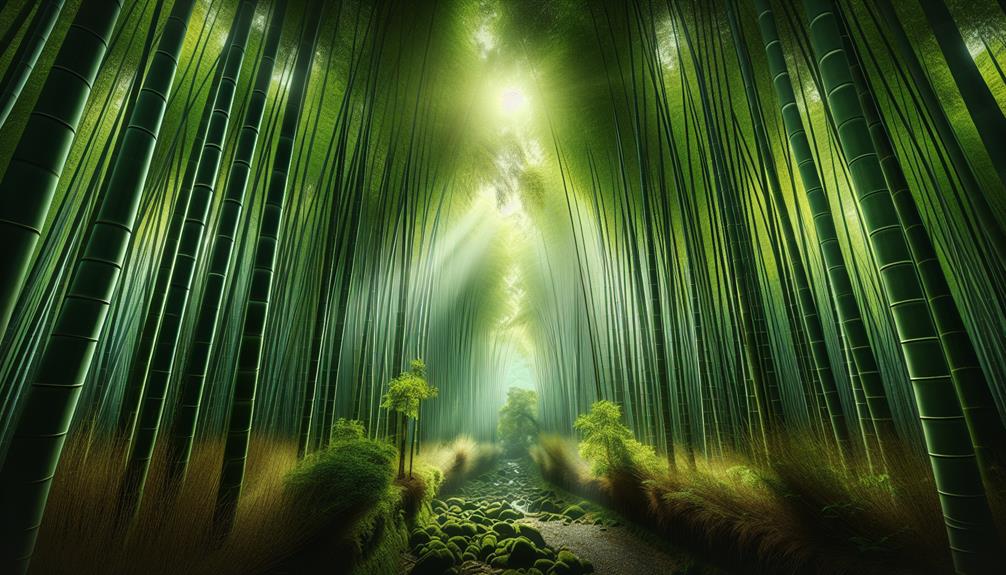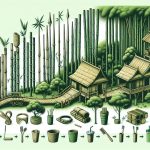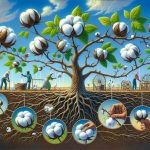Bamboo's pretty amazing, if you ask me. It's one of the fastest-growing plants on the planet, shooting up fully formed almost overnight. It's not just quick; it's tough, thriving across diverse climates and symbolizing resilience and longevity. Bamboo plays a huge role ecologically too, from carbon sequestration to soil protection. Culturally, it's a symbol of prosperity and has a strong presence in art and rituals. Plus, it's super useful in eco-friendly construction and making breathable textiles. There's a lot more to bamboo than meets the eye, and it's fascinating to see all its uses and benefits!
Table of Contents
Key Takeaways
- Bamboo is one of the fastest-growing plants, capable of rapid regeneration and growth.
- It is a sustainable resource, often used in eco-friendly construction and textile production.
- Bamboo plays a significant role in carbon sequestration, helping to reduce the atmospheric carbon dioxide levels.
- Culturally, bamboo symbolizes strength, resilience, and prosperity across various traditions.
- Its diverse applications range from building materials to clothing, significantly impacting both ecological health and economic development.
Bamboo's Unique Characteristics
Bamboo's unique characteristics, like its rapid growth and cultural importance, make it a fascinating plant to explore. Did you know bamboo is among the fastest-growing plants in the world? It's true! Some species can shoot up nearly a meter in just 24 hours under the right conditions. These new shoots emerge from the ground fully formed, rapidly reaching their full height.
This rapid growth is more than just a cool fact; it's a cornerstone of bamboo's role in many cultures, especially in Asia. Historically, it's been a symbol of resilience and longevity, perhaps because it springs back so quickly after being cut down. This regenerative nature isn't just symbolic, though. The fallen leaves and sheaths create a nutrient-dense mulch that not only feeds back into the soil but also helps prevent soil erosion. This makes bamboo an excellent choice for areas prone to this problem.
Moreover, bamboo thrives in diverse climates, from cold mountains to hot tropical regions, making it a versatile plant in both cultural and environmental contexts. Its adaptability and rapid growth cycle allow for sustainable cultivation and various uses across different cultures and geographies.
Ecological Benefits of Bamboo
While we've explored how quickly bamboo grows, it's also worth noting how this plant significantly benefits our planet's ecology. Belonging to the family Poaceae, bamboo isn't just a fast-growing grass; it's a powerhouse in environmental conservation. Here's why:
- Carbon Sequestration: Bamboo groves are remarkable at absorbing carbon dioxide and releasing oxygen. This ability makes them vital allies in our fight against climate change.
- Soil Protection: These plants help prevent soil erosion and maintain soil stability, which is crucial for watershed protection. This ensures that our rivers and streams are less muddied and more stable.
- Biodiversity Support: Bamboo forests provide a crucial habitat for various wildlife species, helping to sustain biodiversity.
These ecological benefits show how species of bamboo can help fight environmental degradation. Their rapid growth and regenerative nature position them as a sustainable resource, pivotal for ecological health.
It's clear that the more we understand and integrate bamboo into our environmental strategies, the better we can leverage its benefits to create a healthier planet. Every step we take with bamboo leads us closer to a greener future.
Cultural Significance of Bamboo
As we dive into the cultural significance of bamboo, it's clear that this plant has shaped numerous aspects of life across different societies. Bamboo isn't just another plant; it's a powerful symbol steeped in meaning. Traditionally, it represents prosperity and strength, two qualities highly valued in various cultures, especially in Asia. Imagine attending a ceremony where bamboo decorates the space, not just for its beauty but for its cultural resonance, embodying strength and flexibility.
This plant also plays a critical role in rituals, often being a centerpiece in many Asian ceremonies. It's fascinating how its presence can transform a simple ritual into something deeply spiritual and culturally rich. Think about the last time you saw bamboo in a cultural festival or a traditional setting; its role is often pivotal, isn't it?
Moreover, bamboo's influence extends into art and poetry, where it's been a symbol of resilience, adaptability, and beauty for generations. Artists and poets have long admired its jointed stems and unique structure, drawing parallels between bamboo's ability to withstand nature's challenges and our own life struggles. This plant's aesthetic and structural qualities haven't only inspired works of art but have also imbued them with deep cultural significance.
Commercial Uses and Products
Now let's talk about how bamboo is making waves in the commercial world.
From sturdy construction materials to innovative textile products, bamboo's versatility is truly impressive.
It's fascinating how this sustainable resource is shaping industries and changing the game in eco-friendly production.
Bamboo in Construction
Bamboo's rapid growth and sustainability make it an ideal choice for eco-friendly construction projects. It's not just about being green, though; this material brings practical benefits that are hard to ignore. I've seen it used everywhere from low-cost housing to high-end commercial buildings, and it's always impressive.
Here are some key uses:
- Furniture Making: It crafts beautiful and durable furniture.
- Flooring Solutions: Bamboo flooring isn't only stylish but also remarkably sturdy.
- Structural Reinforcement: Its fibers enhance the strength of composite materials used in construction.
Bamboo's tensile strength can match steel, which revolutionizes how we think about building materials. Plus, its natural aesthetics provide an additional layer of appeal in architectural design.
Bamboo Textile Innovations
Moving beyond construction, I've also discovered that bamboo is making waves in the textile industry with its innovative uses in clothing and other products. Bamboo textiles stand out because they're not only soft and breathable but also eco-friendly. This plant grows like a weed, needing little water and no pesticides, which makes it a superstar in sustainable farming.
The versatility of bamboo fabric is impressive, popping up in everything from plush towels to comfy socks. Here's a quick look at some of its uses:
| Product | Benefit |
|---|---|
| Clothing | Moisture-wicking, soft, breathable |
| Bedding | Antibacterial, comfortable |
| Towels | Highly absorbent, gentle on skin |
Using bamboo, I'm embracing a lifestyle that's both comfy and conscious!
Bamboo in Sustainable Development
I've learned that bamboo isn't just a plant; it's a powerhouse in sustainable development.
It's fascinating how it's used in construction and how it impacts the economy.
We'll explore how this eco-friendly resource is shaping a greener future.
Bamboo: Eco-Friendly Resource
In today's world, bamboo is a top choice for eco-friendly development due to its rapid growth and carbon sequestration capabilities. It's seriously amazing how this plant supports sustainable practices across various industries. Here's why I'm all in on bamboo as an eco-warrior:
- Rapid Regeneration: Bamboo grows incredibly fast, which means it can be harvested frequently without causing environmental degradation.
- Carbon Fighter: This plant is a champ at absorbing carbon dioxide, which is crucial for tackling climate change.
- Forest Friend: By providing an alternative to traditional wood, bamboo helps reduce deforestation, preserving biodiversity and forest ecosystems.
I'm convinced that embracing bamboo is a step forward in reducing our ecological footprint and promoting a healthier planet. Let's go green with bamboo!
Bamboo in Construction
Bamboo's making a big splash in sustainable construction, thanks to its strength and quick growth. It's not just about how fast it grows; this plant rivals steel in tensile strength, yet it's surprisingly flexible. That means it can take a beating from natural disasters like earthquakes without breaking a sweat.
When I think about the alternatives—concrete, steel—bamboo's low environmental impact really stands out. It's a game changer in reducing our carbon footprint. By integrating bamboo into buildings, we're not just throwing up structures; we're promoting eco-friendly practices that pave the way for a greener planet.
It's a win-win for both our built environment and the Earth's future.
Economic Impact of Bamboo
Exploring the economic impact of bamboo reveals how it's not only a boon for the environment but also a catalyst for boosting economies, especially in rural areas. This versatile plant isn't just about traditional uses; it's reshaping economic landscapes by offering sustainable, innovative opportunities.
- Job Creation: Bamboo cultivation and processing generate numerous jobs, helping lift communities out of poverty.
- Sustainable Products: Its use in making eco-friendly products from furniture to textiles supports greener economies.
- Carbon Sequestration: Bamboo forests act as carbon sinks, aligning economic growth with climate action.
Delving into bamboo's role in sustainable development, it's clear that its value extends far beyond just being another plant; it's a powerhouse driving economic and environmental sustainability.
Future Prospects of Bamboo
Let's dive into how bamboo is shaping up to be a key material for future sustainable development. This plant isn't just another tree in the forest; it's a powerhouse of potential. With its rapid growth rate, bamboo is a prime candidate for renewable resource status. It's not just about growing quickly, though. The innovations in bamboo technology are seriously game-changing. We're talking about advancements that enhance its application across various industries—from construction to clothing.
Now, consider the environmental angle. Bamboo cultivation is a champ at carbon sequestration. That means it can play a big role in pulling carbon dioxide out of the atmosphere, helping us tackle climate change. Plus, there's a growing market demand for bamboo products. People are catching on to its benefits, and it's becoming more popular by the minute, boosting its economic significance.
All these factors contribute to bamboo's standout role in sustainable development. It's not just about being eco-friendly; it's about providing practical, sustainable solutions that meet our needs today without compromising the future. So, yeah, bamboo's prospects? They're looking pretty bright.
Frequently Asked Questions
What Are 5 Interesting Facts About Bamboo?
I'll share five cool facts about bamboo: it's the quickest growing plant, not a tree but a grass, cools the air naturally, rarely flowers, and is a tasty, nutritious food in Asia.
How Do You Describe Bamboo?
I'd describe bamboo as an incredibly versatile, fast-growing plant that's both eco-friendly and durable. It's used in everything from construction to crafts, thriving across various climates while benefiting the environment significantly.
What Do You Need to Know About Bamboo?
I've learned bamboo is not just any plant; it's a versatile, sustainable resource crucial for ecological balance, cultural significance, and commercial use, from construction to textile industries, with impressive health and environmental benefits.
What Is Bamboo Description for Kids?
I'd describe bamboo as a super-fast growing plant that looks like a tree but is actually a type of grass. It's used for making everything from houses to paper and even clothes!
- What Is Bamboo Also Known As? - April 22, 2024
- What Is a Few Sentence About Bamboo? - April 22, 2024
- How Does Bamboo Impact Society? - April 22, 2024







